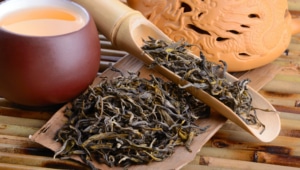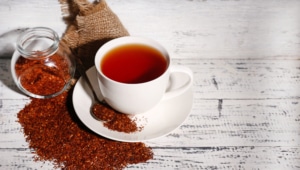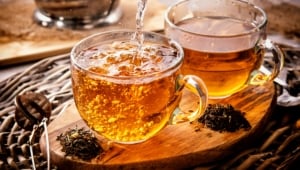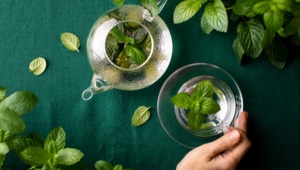10 Health Benefits of Ginger Tea & 3 Tips
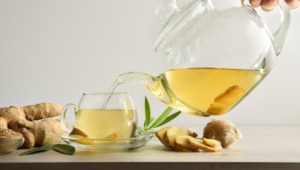
In China and India, ginger has been used in a medicinal tonic for more than 5000 years. Ginger tea, as such, is one of the most ancient natural medicines you can use. Find here all of the health benefits of ginger tea and learn how to make your own.
In short: ginger tea is full of anti-inflammatory properties. But there’s much more to this special root than just that. In this article we’ll explore why ginger tea is so beneficial for both your body and mind, and how you can incorporate it into your diet to reap the rewards.
We’ll also share some of the best recipes for ginger tea-based beverages and more.
What Ginger Tea Is: Interesting Facts

What Ginger Tea Is: Interesting Facts
Ginger tea is an ancient herbal tea, which is enjoyed across the world for its spicy taste and many health benefits.
Ginger first arrived in the Western world via the spice trade, when it was introduced to Europe. It’s likely there it got its name, too.
The word ‘ginger’ comes from the Middle English word ‘gingivere.’ Some sources claim ‘ginger’ to have once been an occupational name for someone who deals in spices.
In Sanskrit, ginger is known as ‘srngaveram’, which means ‘horn root.’ Essentially, it’s called this name for its unusual appearance.
Ginger is, of course, also a modern and sometimes derogatory name for someone with red hair. Interestingly, this stems from Britain’s occupation of parts of Malaysia in the 1800s. Malaysia grows red ginger plants, and the namesake color of these inspired the modern term.
Origin and Where Ginger Tea Comes From

Origin and Where Ginger Tea Comes From
Ginger is a perennial plant, which originally grew in the tropical rainforests of Southern Asia and India. Nowadays, it’s grown across Asia, the West Indies, and the USA.
What Ginger Tea Is Made Of
Ginger tea is made from either fresh or dried ginger root. It’s been used in natural medicines across many parts of Asia for thousands of years.
What Ginger Tea Tastes Like

What Ginger Tea Tastes Like
Ginger tea tastes a little spicy, warming, and earthy. Fresh ginger arguably has a spicier, zingier flavor, while the dried tea is a bit more mellow and retains more earthiness.
How exactly your tea will taste also depends on the quality of the roots used, whether it’s been dried and packed in tea bags or pulverized, and how long it’s steeped for.
Does Ginger Tea Have Caffeine?

Does Ginger Tea Have Caffeine?
Ginger tea is completely caffeine-free, making it a good choice for those who can’t tolerate caffeine well or those needing to avoid it for medicinal reasons.
Ginger tea is also fairly popular amongst pregnant women experiencing nausea, though you’ll still want to be mindful of not having too much of it.
Nutritional Facts and Calories of Ginger Tea

Nutritional Facts and Calories of Ginger Tea
Ginger, and in particular the fresh root, is said to be a powerhouse of nutrients. It contains B vitamins, vitamin C, riboflavin, niacin, thiamine, calcium, sodium, magnesium, potassium, manganese, phosphorus, zing, iron, and copper.
Ginger also contains amino acids, phytochemicals, and plenty of free radical-fighting antioxidants.
As far as calories are concerned, ginger tea by itself contains very few. If you add milk or sweeteners, it will have more calories.
Health Benefits of Drinking Ginger Tea

Health Benefits of Drinking Ginger Tea
Ginger tea has been used to alleviate all kinds of ailments for thousands of years. It’s still popular to this day. Here is a list of the most common health problems ginger tea can be used for. You’ll be surprised to find out just how well it works.
Helps Alleviate Nausea and Motion Sickness

Helps Alleviate Nausea and Motion Sickness
Ginger tea is a cheap and effective natural treatment for nausea. It’s helpful for motion sickness, morning sickness during pregnancy, and any other types of vomiting-related issues.
If you’re undergoing cancer treatments such as chemotherapy, you’ll be glad to find out that ginger tea is a good natural treatment for nausea and vomiting caused by this.
May Help in Keeping Your Heart Healthy

May Help in Keeping Your Heart Healthy
This spicy tea can help boost your heart health. Drinking ginger tea daily or taking 2-6 g of ginger every day may have protective properties against heart disease.
Research suggests it may even help prevent heart attacks from happening. Ginger increases the antioxidants in your body and reduces inflammation — both of which are vital for good heart health.
Could Be Beneficial for Managing Your Blood Pressure

Could Be Beneficial for Managing Your Blood Pressure
Ginger tea may be helpful at lowering elevated blood pressure.
One study showed that 8 weeks of daily supplementation with ginger reduced blood pressure in people suffering from hypertension.
Ginger tea is especially known for reducing blood pressure, so adding it to your daily diet may be a helpful option if this is a problem you suffer from.
Might Help Balance Blood Sugar Levels

Might Help Balance Blood Sugar Levels
Ginger tea has been shown to be a helpful natural remedy for lowering blood sugar levels. It can also aid in regulating insulin sensitivity if you have diabetes.
One study suggested that ginger might be helpful at managing glucose in your body.
If you have diabetes, you may wish to enjoy ginger tea on a regular basis.
May Aid in Weight Loss

May Aid in Weight Loss
If you’re looking to lose some weight, ginger tea may help boost your metabolism, reduce hunger, and enhance your body’s ability to burn calories.
The tea also has very few calories (unless you add sweeteners), so it’s easy to add to your daily diet.
Ginger tea has diuretic properties, helping you shed excess water weight, too.
Helpful for Relieving Inflammation and Pain

Helpful for Relieving Inflammation and Pain
Ginger tea has been proven to reduce inflammation in your body. This is one of the key reasons it’s been used since ancient times.
Reducing inflammation also helps reduce pain, meaning it’s great for easing chronic pain, arthritis, and fibromyalgia. It’s a powerful natural remedy for any kind of pain and inflammation.
Potentially Has Cancer-Fighting Properties

Potentially Has Cancer-Fighting Properties
Several studies appear to show that ginger contains components, which are able to suppress cancer growth.
Ginger tea may be helpful when fighting a variety of cancers including brain, pancreatic, liver, colon, ovarian, cervical, renal, breast, oral, prostate, and gastric cancers.
Might Have Protective Properties for Your Brain

Might Have Protective Properties for Your Brain
Ginger tea may have protective properties for your brain. Ginger contains antioxidants and bioactive compounds, which together reduce inflammation in your brain.
As a result, cognitive decline may be prevented in some form. This is helpful news for those suffering from dementia and other age-related ailments of the brain.
Helpful Against the Common Cold

Helpful Against the Common Cold
If you have a cold or other infection, ginger tea will help. It can soothe sore throats, reduce inflammation, and more.
Ginger tea also offers antibacterial and antifungal properties, meaning it will actually help get rid of the bugs your body is fighting off, too.
Add some honey and lemon to your ginger tea for a powerful cold-busting drink.
Can Speed Up Your Digestive System

Can Speed Up Your Digestive System
Ginger tea doesn’t just help with weight loss – it can speed up how your digestive system works, too. As such, a little bit of ginger tea may ease cramping, gas, and bloating.
Too much ginger tea can upset your stomach, but a little may actually help you feel better.
Potential Risks

Potential Risks
Any herbal remedy that can help will inevitably also carry some risks. This is also true for ginger tea, though most risks come with overconsumption.
Below is a list of the most common side effects you may experience if you have too much ginger tea, or if you combine it with certain medications.
Could Increase Your Risk of Bleeding
Ginger tea may increase your risk of bleeding. A compound in ginger inhibits blood clotting and diminishes the constriction of blood vessels.
As such, pairing ginger tea with blood-thinning medication may be risky. If in doubt, speak to your doctor about wanting to add ginger tea to your diet.
May Cause Digestive Issues, Nausea or Heartburn

May Cause Digestive Issues, Nausea or Heartburn
Too much ginger tea could cause side effects, including diarrhea, gas, abdominal pain, or heartburn. Generally, these effects will be mild, but if you have excessive amounts you might notice more uncomfortable issues.
Might Interfere with Some Diabetes Medications
Ginger tea is seen as helpful for lowering blood sugar levels. With that said, if you’re already taking diabetes medication, having ginger tea as well could raise your risk of developing low blood sugar, or hypoglycemia.
If in doubt, speak to your doctor before adding ginger tea to your diet.
Too Much May Worsen Heart Conditions

Too Much May Worsen Heart Conditions
Some heart conditions could be worsened if you have vast doses of ginger — generally way more than you could ever have in tea or food.
However, smaller daily doses of two to six grams may actually have protective properties for your heart and even lower blood pressure levels.
Is Ginger Tea in Pregnancy Good For You?

Is Ginger Tea in Pregnancy Good For You?
In moderation, is ginger tea in pregnancy good for you. Up to two to three cups of ginger tea per day (or up to 1g of fresh ginger steeped in hot water) can help with pregnancy-related nausea and vomiting.
Experts do warn against consuming high doses as these could potentially raise your risk of miscarriage.
Do not consume high doses of ginger supplements during pregnancy, and, if you’re very cautious, consider limiting your intake of this helpful tea to the second and third trimesters.
You may wish to avoid ginger entirely if you’re in a high risk pregnancy or suffering from bleeds.
Having some ginger tea once you’re further on in your pregnancy may provide helpful benefits to your baby, as ginger is full of protective antioxidants. Having some ginger tea can boost your immune system and help keep you healthy during pregnancy.
Good to know:
If in doubt, you could always speak to your doctor about adding ginger tea to your pregnancy diet, particularly if you’re in the early stages of pregnancy. Ginger tea is also said to be quite safe when enjoyed in moderation if you are breastfeeding.
Simple Guide for Making the Perfect Ginger Tea

Simple Guide for Making the Perfect Ginger Tea
The simplest way is frequently the best, and this is certainly the case for ginger tea. Start with fresh ginger root, then try it with a variety of different flavors to suit your taste.
Ingredients:
- 2” of fresh ginger (cleaned but unpeeled)
- 2 cups of water
- 2 tsps of honey
And here’s how you do it:
- Finely slice the ginger into your pot of water and gently bring to a simmer. Simmer your tea for 5-10 minutes, depending on how strong you like your ginger tea.
- Stir in the honey and strain your tea into two cups. Serve immediately and enjoy.
If you like, you may add some additional ingredients during the cooking process. Cinnamon, fresh mint, lemon or orange, turmeric, and brown sugar are all great additions. Experiment with which flavor combination you like best.
Tips for Drinking and Serving Ginger Tea

Tips for Drinking and Serving Ginger Tea
If you’ve already made our simple recipe for ginger tea above and liked it, you may be wanting to experiment a little more.
Ginger is great in tea and obviously offers many health benefits, but you can make it even better. Here are some of our top tips for making even tastier ginger tea-based beverages.
Add Honey for Some Sweetness

Add Honey for Some Sweetness
Honey is well-known for its antioxidant, antibacterial, and anti-inflammatory properties.
Paired with ginger it makes for a healthy addition to almost any diet, and can be particularly helpful for colds, pains, and digestive problems.
It also takes away some of the sharpness and spiciness of ginger tea, and makes it a lot sweeter.
Mix Ginger Tea with Lemon, Apple Cider Vinegar and Spices

Mix Ginger Tea with Lemon, Apple Cider Vinegar and Spices
We came across this recipe on our hunt for the best possible natural cold remedy.
It combines ginger tea made from fresh ginger root, fresh lemon juice, cinnamon sticks, star anise, chamomile tea, apple cider vinegar, honey, and water.
Unfiltered apple cider vinegar with the ‘mother’ still in it works as a potent probiotic, which can really help against colds and respiratory infections.
This aside, the entire mix sounds delicious and is sure to warm you and make you feel a lot better.
Enjoy a Ginger Smoothie with Spinach

Enjoy a Ginger Smoothie with Spinach
Don’t like ginger tea or warm beverages? No problem.
Grab your blender and whip up an easy ginger-based smoothie by adding ginger, almond milk, turmeric, bananas, pineapple, baby spinach, lemon juice, and ice.
Blend to your preferred consistency and enjoy.
- Chai Tea. Health Benefits and Hacks.
- Raspberry Leaf Tea. Tips, Hacks and Health Benefits.
- Starbucks Refresher. Tips and Best Drinks.
- Jelly Belly Flavors. Best and Grossest.
- Boba Flavors. Best Flavors and Types.
- Pop Tart Flavors. Tasty Alternatives and Best Flavors.
- Cinnamon Tea. Health Benefits and Tips.
